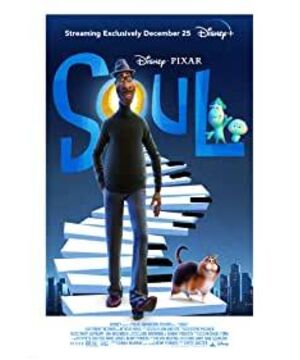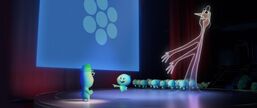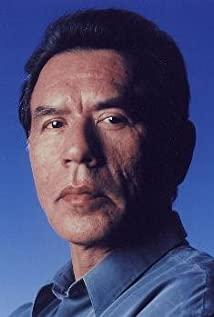There is no doubt that "The Spiritual Journey" is a film building with exquisite structure and grand narrative. No matter from which angle people analyze and interpret it, they will inevitably feel the feeling of peeking at a leopard or a blind man touching an elephant. Especially when it comes to philosophical themes, the audience may only be able to grasp the scales and claws of it, and recognize some old or novel philosophical concepts, and therefore interpret the film as "chicken soup stew" or "profound". insight". However, interpretation is just like that. With the development of hermeneutics today, there has long been no difference between the so-called "original real text or image" and "interpreted text and image". Like artistic creation or poetry, meaning is multiplied and iterated on the original texts and images, and new truths are constantly generated.
Going back to the film itself, it only takes a quick glance to discover that there are a lot of Western philosophical concepts behind the exquisite story of "The Journey of the Soul", such as the dualism of mind and body where the soul and body can be separated, the distinction between innate personality and nurture, and the pursuit of the duality of meaning. Patterns - Divine Chosen Stream and Body Phenomenology Stream, etc. In the exchanges with some friends, I also heard discussions about whether there is existentialism and nihilism in the film. If a movie contains rich seeds, it can give birth to plants of different shapes under the right opportunity. In this sense, "Spiritual Journey" is a philosophical animation with profound meaning.
Today's cities have been highly urbanized and industrialized, and their culture has been deeply de-enchanted. For many young people living in this atmosphere, alienation and loneliness are the emotions they are most likely to experience, while meaninglessness in life often invades them ideology. Compared with young people five hundred years ago, today's young people are more individual, but at the same time more atomic; more free, but also more sensitive to involuntary; more ideas, but not necessarily strong execution; seen The world is bigger and more information-intensive, but also less powerful. The most important point is that all noble things have collapsed, all metaphysical values have been dissolved, all transcendent things have become illusions, today's young people live completely in the present moment, weaving in the web of mundane life. dream. They are free to choose the values and lifestyles they want, but this freedom equalizes all values, as if choosing anything, freedom has become a burden and a curse. They seem to be able to set aside all social premises and explore the sparks and depths of their souls alone in the dark, but during the day, the mechanisms of social production and meaning lie on their shoulders like Sisyphus' boulders, and they have to turn themselves into betrayals The machinery of labor is in constant motion. The tearing of night and day makes young people's brains and hips separate, and their knowledge and actions are different. They have to suffer the pain of soul splitting. The freedom of the individual in industrial society is an illusion, a rhetoric, young people can of course escape from city to city, from shopping mall to shopping mall, but as long as they always encounter the same production-consumption Logic, as long as their labor is still being alienated by capital, contemporary young people are hardly free.
In this historical context, Joey can be regarded as a very lucky one. Unlike most young people who seek the value of their life in confusion, he discovered his heart early through the opportunity of listening to jazz playing at a young age. Once one discovers his vocation and calling, there is a high probability that a person will return to the life called for by his inner voice, no matter how deviated his previous life is. And the difficulties he will encounter are only the reasons for this deviation. According to my observation, no more than one in ten people can find their vocation, and this probability is likely to be greatly overestimated. The lucky ones who have found their vocation have a completely different life style from ordinary people, and their troubles are rarely filled with the ordinary troubles of ordinary people's lives. They are easily immersed in the spark of their destiny and forget the passage of time. People like Joey are obviously a minority among human beings, the chosen ones, and many Western movies and Chinese movies generalize such paradigms into a common potential form of human beings. Under the current historical conditions, this is obviously a bowl. "Poison Chicken Soup". Because for most people who are not lucky, spending a lot of time and energy looking for so-called "sparks" is often useless, and over time and age, they will fall into self-doubt that they do not actually have a This kind of "authenticity", but that ideal keeps provoking them, as if at a certain moment in their life, the door of luck will open with a "pop", and they will exclaim "This is it!"
"Be yourself", "be yourself" and other "cliches" as the political correctness of certain types of films do have their ancestors in the history of Western thought. In his work "Being and Time" written in the 1920s, Heidegger clearly put forward the concept of authenticity and non-authenticity of existence. Non-authentic existence refers to the mediocrity of individuals , follow the trend of living, how anonymous "others" live, how he lives, what "others" think, what he thinks, how "others" decide, how he decides. The non-authentic individual is lost in the trivialities and triviality of life, and most importantly, he loses himself and dissipates under the huge shadow of others. Isn't inauthenticity everywhere today? Information explodes, opinions proliferate like cancer, preferences are intertwined with preferences, and experiences overlap with experiences, so much so that we were indignant about a certain Weibo news yesterday, we were brought to the rhythm without knowing it, and today we are swayed by a certain 100,000 plus public. The number hot text stirred up the mood and made it difficult to calm down. During the day, we do the work of thousands of people, and at night we laugh and cry with others at station B or Douyu, or are immersed in some kind of grand narrative and cannot extricate ourselves. Today's production and consumption mechanism and cultural meaning production mechanism constantly stimulate each individual's senses and nerves, giving the individual a false concept of self-uniqueness. We think that a certain consumer preference is unique, that this commodity is "mine", that the pleasure of this moment is my private good, that my photos and experiences can unequivocally define my personality and value, and so on. However, these preferences, commodities, pleasures, and experiences are all charging piles for consumption social significance nodes, and individuals are nothing more than human flesh batteries. Individuals input commodities and output pleasure, or input pleasure and output labor.
Authentic survival, which is different from non-authentic survival, requires the individual to make decisions based on oneself. The individual rejects the noisy "what others say" and listens to the call of the so-called conscience. Often, however, the conscience is silent for so long that we hear nothing but the silent echo of the void. Just as Joey has found his calling, there are very few people who can truly survive. Heidegger did not take into account that many people are not unwilling to listen to the call of conscience, but that it is rare for people like him who can be "called" by God without getting lost in the opinions of ordinary people. True survival does not depend on choice or will. , but depends on ability and luck. From my personal life experience, the moments of authenticity are not nonexistent, but fleeting, they come inadvertently, often in solitude. Retrospective recall cannot bring back that authenticity, it can only provide some kind of experience dregs that can be recalled and analyzed. For ordinary people who lack talent, the most they can do in the dimension of "authenticity-non-authenticity" is to try not to be affected by various information narratives, and to wait quietly in the purified self-experience. The advent of authenticity. In addition to Heidegger, there are many philosophers in the history of Western thought who have changed from non-authentic existence to authentic existence, such as Augustine and Rousseau. None of them made this shift based on self-determination, and it was often the case that something happened by chance and an experience popped up that lighted them up. Perhaps the contingency and timing of the transformation of authenticity in the history of Western thought have a great connection with their unique Christian religious narrative. Doesn't the Messiah know when he will come? Isn't inner conversion and change happening all the time and waiting for that moment? Our “brave to be ourselves” today is most likely the result of such religious narratives shedding the veneer of transcendence and internalizing the experience of self-determination.
Ordinary people are nothing more than 22, and it is the normal state of life that they cannot find sparks. In this case, The Journey of the Mind shows us how a life devoid of meaning can reconstruct meaning through physical sensations. It's not just as simple as "living in the moment" or "just having fun" as people usually say, because it involves a shift from a "tool-goal" cognitive-practical rational attitude to a bodily phenomenological attitude. Philosophers such as Weber and Habermas pointed out that the construction of modernity is inseparable from the realization of various rational functions. With the realization of these rational functions, various fields are separated from the original chaotic life world. We have the separation of the state and the market, the separation of the moral and legal fields, the independence of the scientific community, the separation of religion and art, and so on. Pre-modern society is a society in which the boundaries between various fields are relatively blurred or even non-existent. Until modern times, with the independence and awakening of various rational abilities, the social division of labor has consciously moved towards a refined, hierarchical, regionalized, and systematic one. With the rapid development of social production efficiency, social life is like a huge precision machine, and each individual as a small machine is tightly inserted into it. The social machine thinks and operates in this way, and the individual does not consciously imitate the machine to think and operate in this way. In the most extreme case, all people and things that do not conform to the rational framework of "tool-purpose" are regarded as episodes, embellishments or irrelevant things by the individual. abandoned. Individuals regard themselves as a tool to achieve a certain goal, so everything is also a tool, and all beings fall into the two categories of "tool" and "non-tool". The most typical example is that time has become a tool, and under the ideology of efficiency and quantity, time has become extremely important. When an individual masters time, he feels at ease, has a sense of existence, and has a sense of control; when an individual loses the world, he is anxious, flustered, and bored.
Modern rationality inevitably gave birth to a large number of so-called "refined egoists". In contrast to the rational attitude is the phenomenological attitude of the body found in 22. This attitude is not entirely an aesthetic attitude. Aesthetic means to see life and the world as a whole as a work of art, to find beauty in it, and then to experience beauty. The problem with the aesthetic attitude is that most people, except a few living artists, will find it a rather unnatural and even artificial attitude. Seeing life and the world as a whole as a work of art is a dubious assumption, unattainable, unsustainable, and generally a less realistic attitude. The secret of the bodily phenomenological way of life is that it requires the individual to first empty his mind, presuppositions, concepts, and then experience the world around him with his body like a newborn. Don't think, but see, don't judge, but feel. When all things do not fall into the many frames presupposed by thinking, the individual can rediscover a world that is both familiar and unfamiliar. Many troubles in real life actually stem from people being too obsessed with concepts rather than things themselves. For example, when Westerners and Chinese people talk about whether a certain type of life is free, their eyes are too focused on the unique charm of the word "freedom". As if "liberty" were the holy word printed in the Bible, people became conceptual fundamentalists in the discussion about it. However, in fact, "freedom" and "unfreedom" are just concepts. Shouldn't we focus on the basis of these concepts, which is life as it is and whether it is good or not? Chanting is a quirk of the mind, and only a full bodily experience can access the source of these concepts. In short, don't let your words hurt your righteousness.
22 There is no concept at work here to see the fallen leaves fluttering in the honey-like sunshine and feel the primordial beauty. Feelings of pure material elements. In such a way of life, the search for meaning itself has lost its meaning, meaning no longer exists as a goal, but is rediscovered as a mundane, scattered everywhere, from the dangling of the roadside vegetation, to the The mysterious footsteps of the empty valley, from the noisy and shining faces in the shopping mall, to the fluttering wings of the river bank, can be seen everywhere. Meaning does not act as a distant ideal in time, it only needs a body that is no longer tense and radiates anxiety. One can find clues of this kind of meaning realization mode in some Buddhist practice theories. Since the twentieth century, the development of phenomenological theory and the prevalence of various spiritual theories have also contributed to its formation more or less.
At the end of the film, Joey is disappointed after realizing his ideal, which seems to verify the intention of the filmmaker: the meaning as an ideal may be just a fictional projection, and the real meaning is actually in the process itself, not the result. Or, there is no process and result at all, there is only how the individual lives. Beyond the film itself, I actually want to say that the liberation, freedom, and happiness of the individual depend largely not on the individual itself, but on how society works, and the price that the individual must pay for society to do so.
View more about Soul reviews











